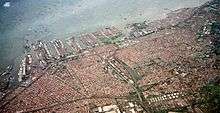Port of Tanjung Priok
| Port of Tanjung Priok | |
|---|---|
|
Aerial view | |
| Location | |
| Country |
|
| Location | Tanjung Priok, North Jakarta |
| Coordinates | 6°06′14″S 106°53′11″E / 6.104°S 106.8865°ECoordinates: 6°06′14″S 106°53′11″E / 6.104°S 106.8865°E |
| Details | |
| Owned by | PT Pelabuhan Indonesia II |
| Type of harbor | Natural |
| Size of harbor | 604 ha (6.04 sq km) |
| Land area | 424 ha (4.24 sq km) |
| Size | 1,028 ha (10.28 sq km) |
| Available berths | 76 |
| Statistics | |
| Annual container volume | 6.59 million TEU's (2013)[1] |
|
Website www | |
The Port of Tanjung Priok is the busiest Indonesian seaport, handling more than 50% of Indonesia's trans-shipment cargo traffic. The port is among the least efficient in all Southeast Asia, with turn-around times 6 times that of Singapore, and severely congested due to slow customs handling, as well as limited port capacity.
In regards to the port capacity, two-phase "New Priok" extension project is currently ongoing; when fully operational in 2023, it will triple existing annual capacity. First phase of the project will be completed in 2015.
In addition to that, there has been discussion to build another port, Cilamaya in Karawang Regency, which is being pushed by Japanese government and industrialists.[2] However, the proposal is currently on hold, as there was lots of objections from various parties.
History
The old name of Jakarta was Sunda Kelapa. The earliest record mentioning this area as a capital city can be traced to the Indianized kingdom of Tarumanagara as early as the fourth century. In AD 39, King Purnawarman established Sunda Pura as a new capital city for the kingdom, located at the northern coast of Java.[3] Purnawarman left seven memorial stones with inscriptions bearing his name spread across the area, including the present-day Banten and West Java provinces. The Tugu Inscription is considered the oldest of all of them.[4]
After the power of Tarumanagara declined, all of its many territories, including Sunda Pura, became part of the Kingdom of Sunda. The harbour area were renamed Sunda Kelapa as written in a Hindu monk's lontar manuscripts, which are now located at the Bodleian Library of Oxford University in England, and travel records by Prince Bujangga Manik.[5] By the 14th century, Sunda Kelapa became a major trading port for the kingdom. The first European fleet, four Portuguese ships from Malacca, arrived in 1513 when the Portuguese were looking for a route for spices, especially black pepper.[6]
Jakarta's Container Port (JCP), now is known as Jakarta International Container Terminal (JICT) operated by the Hutchison Port Holdings and PT Pelindo II is the largest container terminal in Indonesia and the country's national hub port.[7][8] At April 2011, JICT received an Asian Freight and Supply Chain Award (AFSCA) as the best service quality and technology innovation of terminal with less than 4 million twenty-foot equivalent units handling capacity.[9]
Description
The Port of Tanjung Priok has 20 terminals: general cargo, multipurpose terminal, scraps terminal, passenger terminal, dry bulk terminal, liquid bulk terminal, oil terminal, chemicals terminal and three container terminals, 76 berths, a quay length of 16,853 metres, a total storage area of 661,822 m2 and a storage capacity of 401,468 tonnes.[10]
References
| Wikimedia Commons has media related to Tanjung Priok. |
- ↑
- ↑ http://www.jica.go.jp/information/seminar/2013/...att/04matsuno_toyota.pdf
- ↑ Sundakala: cuplikan sejarah Sunda berdasarkan naskah-naskah "Panitia Wangsakerta" Cirebon. Yayasan Pustaka Jaya, Jakarta. 2005.
- ↑ The Sunda Kingdom of West Java From Tarumanagara to Pakuan Pajajaran with the Royal Center of Bogor. Yayasan Cipta Loka Caraka. 2007.
- ↑ Three Old Sundanese Poems. KITLV Press. 2007.
- ↑ Sumber-sumber asli sejarah Jakarta, Jilid I: Dokumen-dokumen sejarah Jakarta sampai dengan akhir abad ke-16. Cipta Loka Caraka. 1999.
- ↑ Port Commerce
- ↑ Hutchinson Port Holdings
- ↑ http://www.thejakartapost.com/news/2011/04/30/jict-wins-asian-container-port-award.html
- ↑ Port of Tanjung Priok facilities

